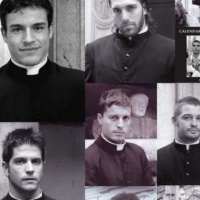Philippians 2
5 In your relationships with one another, have the same mindset as Christ Jesus:
6 Who, being in very nature[a] God,
did not consider equality with God something to be used to his own advantage;
7 rather, he made himself nothing
by taking the very nature of a servant,
being made in human likeness.
8 And being found in appearance as a man,
he humbled himself
by becoming obedient to death—
even death on a cross!
9 Therefore God exalted him to the highest place
and gave him the name that is above every name,
10 that at the name of Jesus every knee should bow,
in heaven and on earth and under the earth,
11 and every tongue acknowledge that Jesus Christ is Lord,
to the glory of God the Father.
 I’ve got a new granddaughter, born three and a half weeks ago. Her name is Maeve.
I’ve got a new granddaughter, born three and a half weeks ago. Her name is Maeve.
Her older sister, Cora, who is five, initially had problems getting the baby’s name right, and suggested to her mum, “Why don’t we just call her ‘Strawberry’?”
Names can sometimes be confusing.
I was at school with a lad called Hamish Marshall. But he signed his name “James” – “Hamish” being the Gaelic for “James”.
I can sympathise. I too have a first name that confuses many people. I was christened ‘Alexander’ but am known as ‘Sandy’ which is a shortened form – or a diminutive, to give it it’s proper description. ‘Sandy’ always reminds me of third-rate Scottish comedians or collie dugs!
My uncle was also Alexander, but was known as ‘Alec’ and I have a friend who is ‘Alex’ with an ‘x’ I once looked up a dictionary of names and to my horror discovered that another version is ‘Sanders’ – maybe, on hindsight, it is a bit more upmarket that ‘Sandy’
In Gaelic, Alexander becomes ‘Alastair’ or ‘Alasdair’
I once met a Russian lady at university, who told me that in her country, a version of Alexander is ‘Sacha’ – (Sacha Distel – French singer)
There’s a Nothampton Town football player – previously with Aberdeen – who rejoices in the name of Zander Diamond, as does Alexander Armstrong, the comedian and presenter of the TV quiz show “Pointless”, who is also known to his close friends as “Zander”.
Rather fancy that moniker!
And I’m sure there are many more variations on my particular name – as there are on so many others: Robert can be Rob, Robbie, Bob or Bobby, Bert or Bertie. Catherines are sometimes known as Kate, or Katy or even Renee.
Another friend of mine was James, as far as his family was concerned, but Jimmy to myself and his other friends, even after he changed it himself to Jim.
He was the same person, of course, but others saw him differently – James for his parents, brothers and sisters – the name his mother and father had given him, the name which was registered after his birth, the name given at his baptism – his official name
. But Jimmy to his pals who knew another facet of his personality – Jimmy, a familiar, easy-to-relate to kind of name – the name of a pal, a friend, a mate. Then he himself started calling himself ‘Jim’ – more grown-up perhaps than Jimmy, more formal than Jimmy, but less so than James.
He saw himself as ‘Jim’ whatever the implications of that were.
Some people see us in different ways and call us by different names, as the case of friend Jimmy shows.
Perhaps something of this was reflected in the different names people had for Jesus.
The prophet Isaiah writing about the Messiah called him ‘wonderful counsellor, mighty God, everlasting Father, Prince of Peace’
The hymn writer, John Newton, once wrote: ‘Jesus my shepherd, brother, friend, my prophet, priest and king, my Lord, my life, my way, my end’
Jesus is different things, has different names, different aspects for different people – depending on their outlook, depending on their needs.
There is a bridge in an old European town where each archway has a carving of Jesus represented in a different way.
As the workmen cross the bridge early in the morning, they can pause for a moment at the figure of Jesus the carpenter.
The farm workers on the other hand can see him depicted as a shepherd.
The elderly and sick can view him as the great healer.
Those who are feeling tired or discouraged are reminded of Jesus the friend.
So all who cross that bridge can find the picture of Christ which suits their particular need.
And he fills all our needs.
He said of himself ‘I am the Way, the Truth, and the Life’ and in him we find our direction, and our integrity, and our very being.
He said of himself ‘I am the Door’ and he opens up for us the way to a new kind of life.
He described himself as ‘The Good Shepherd’ and we know that he will protect us, direct us and guide us lovingly through life to the security of the fold.
And he said ‘I am the Resurrection and the Life’ – in this life and the next, we have nothing to fear.
He is our Redeemer, our Saviour, and our Friend.
And let us remember this – the Bible tells us that ‘God has engraved our name on the palm of his hand’…in other words, we are as near to God as our hands are to us.
God knows us through and through, every last detail about us (why, even the hairs of our head are all numbered). God knows us; Christ loves us – whoever we are, wherever we come from, whatever our name!











